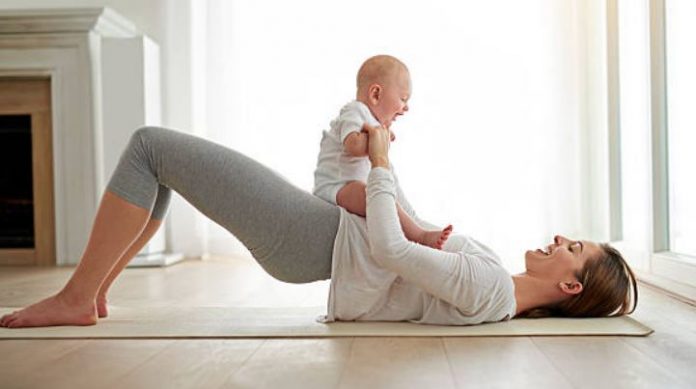Pregnancy does not necessarily have to be the end of your prenatal figure. By making a firm promise to exercise regularly, you can once again regain your appearance, and feel better physically.
During your pregnancy, there were inevitable changes that your body had to adapt to. These include: body weight increase; posture shift; joint relaxation; and increased blood volume.
If your body was unprepared for these changes, then, you probably had to endure the problems of low back pain, aching legs, constipation, urine leakage, and fatigue.
However, now that it’s over… it’s time to exercise. Before you begin, follow these five general rules of postnatal exercising.
1. Take it easy when first starting out.
Work within your body’s limits and build up to more demanding exercises. Your beginning exercises should be relaxing and enjoyable.
2. Stop and rest if you feel pain, breathless or dizzy.
3. Do the exercises properly.
4. Do not hold your breath when exercising.
5. Work out on a firm, but soft surface.
The types of postnatal exercises you should concentrate on the most are the ones that work primarily on those body parts most involved with labor and delivery.
They are…pelvic floor, abdomen, lower back, and inner thighs.
Pelvic floor muscles form a base support for pelvic organs and their contents. These muscles include rectal muscles, vaginal muscles, and urinary sphincters.
During pregnancy, these muscles supported the increased weight of the enlarged uterus and had to stretch during delivery to allow for the baby to pass.
Abdominal muscles also supported the additional weight of the baby. Thus, were required to be stronger and more elastic than usual.
If these muscles were weak before pregnancy… they did not provide adequate support. Thus, the back muscles were forced to do the work that resulted in back strain.
Here are some postnatal exercises that you should begin as soon as you feel up to it after delivery.
Pelvic Tilt: Strengthens abdominal muscles and pelvic floor muscles.
Angry Cat: Strengthens abdominal muscles and buttocks.
Partial Sit-ups: Strengthens abdominal muscles.
Diagonal Curl-up: Strengthens oblique abdominal muscles.
Bridging: Strengthens buttock muscles.
It is also essential to include activities such as walking, jogging, swimming, bicycling, and dancing into your postnatal exercise routine.
These activities work to strengthen muscles, rebuild endurance, regain proper circulation, and respiration. They also help to burn up extra calories if you are overweight from eating for two.
Additional exercises are encouraged. However, the ones given here are those that are essential to the areas of your body that were most affected during pregnancy.
Remember to start slowly. No certain number of repetitions is mandatory. Generally, start with two to five repetitions, and progress, as you are able.
One last tip: Exercise to music whenever possible to make it even more fun and enjoyable.
Before you know it, you’ll have that appearance back that you thought you’d lost forever.

